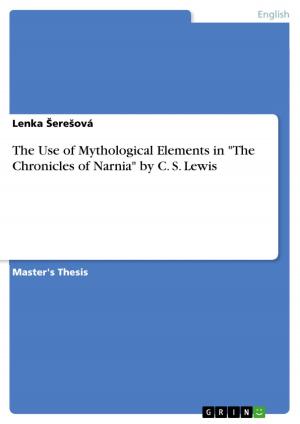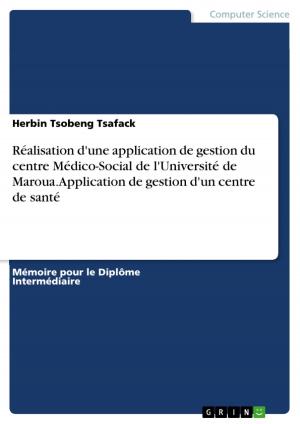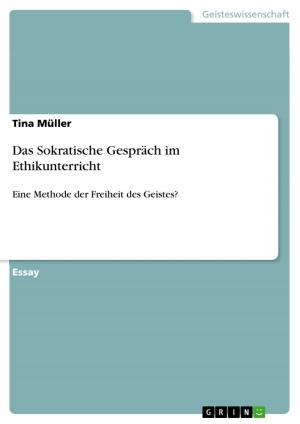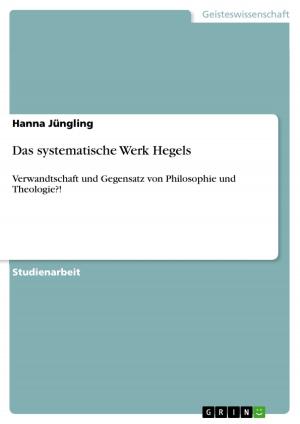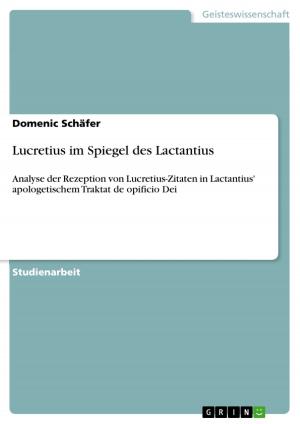Education, Science and Research in Medieval England
Fiction & Literature, Literary Theory & Criticism, British| Author: | Lena Meyer | ISBN: | 9783656958499 |
| Publisher: | GRIN Verlag | Publication: | May 11, 2015 |
| Imprint: | GRIN Verlag | Language: | English |
| Author: | Lena Meyer |
| ISBN: | 9783656958499 |
| Publisher: | GRIN Verlag |
| Publication: | May 11, 2015 |
| Imprint: | GRIN Verlag |
| Language: | English |
Seminar paper from the year 2014 in the subject English - History of Literature, Eras, grade: 1,0, University of Cologne, language: English, abstract: This paper deals with the spaces, methods and contents of learning and studying in medieval England. About 120 schools are known to have existed in England during the period between the Norman Conquest in 1066 and the Reformation in 1517 (Orme 1976: XI). However, such numbers must remain vague and can only offer limited insight into medieval English learning. This is partly due to the relatively low amount of source material, but also the wide range of highly differing institutions which were all referred to with the term 'school' (c.f. ibid.: 2f). Still, some distinctions can be made and similarities can be found in almost all medieval English schools, mostly involving the curricula, manners of education and the people teaching at and attending schools. Additionally, academic institutions had a high social impact on their respective surroundings (c.f. ibid.: 32f). Grant pleads against the underestimation of medieval scientific knowledge by stating that, 'contrary to prevailing opinion, the roots of modern science were planted in the ancient and medieval world long before the Scientific Revolution' (Grant: I). Similar to detecting distinct school-forms, the respective fields of medieval science are hard to define; there was medical as well as artistic and literary knowledge and science did not necessarily involve a strict reading of the Bible (c.f. ibid.: 33f, 22). Interestingly enough, English was not as commonly used in scientific contexts as it is today - the language of science was Latin and therefore its most important basis (c.f. Taavitsainen a. Pahta 2004: XV). Many ancient manuscripts were not only rediscovered, but also translated and adapted, providing medieval scholars with thought-provoking impulse (c.f. Horobin a. Smith 2002: 167). Still, most of these sources were heavily fragmented and religious schools and monasteries remained the rather enclosed centers of knowledge (c.f. ibid. & Grant: 22).
Seminar paper from the year 2014 in the subject English - History of Literature, Eras, grade: 1,0, University of Cologne, language: English, abstract: This paper deals with the spaces, methods and contents of learning and studying in medieval England. About 120 schools are known to have existed in England during the period between the Norman Conquest in 1066 and the Reformation in 1517 (Orme 1976: XI). However, such numbers must remain vague and can only offer limited insight into medieval English learning. This is partly due to the relatively low amount of source material, but also the wide range of highly differing institutions which were all referred to with the term 'school' (c.f. ibid.: 2f). Still, some distinctions can be made and similarities can be found in almost all medieval English schools, mostly involving the curricula, manners of education and the people teaching at and attending schools. Additionally, academic institutions had a high social impact on their respective surroundings (c.f. ibid.: 32f). Grant pleads against the underestimation of medieval scientific knowledge by stating that, 'contrary to prevailing opinion, the roots of modern science were planted in the ancient and medieval world long before the Scientific Revolution' (Grant: I). Similar to detecting distinct school-forms, the respective fields of medieval science are hard to define; there was medical as well as artistic and literary knowledge and science did not necessarily involve a strict reading of the Bible (c.f. ibid.: 33f, 22). Interestingly enough, English was not as commonly used in scientific contexts as it is today - the language of science was Latin and therefore its most important basis (c.f. Taavitsainen a. Pahta 2004: XV). Many ancient manuscripts were not only rediscovered, but also translated and adapted, providing medieval scholars with thought-provoking impulse (c.f. Horobin a. Smith 2002: 167). Still, most of these sources were heavily fragmented and religious schools and monasteries remained the rather enclosed centers of knowledge (c.f. ibid. & Grant: 22).

